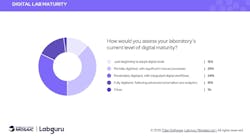Survey of 150+ scientists by Titian Software & Labguru (BioData) reveals data challenges in lab digitization
Data stands at the center of transformation in today’s digital labs — both as a major obstacle and a driving force for innovation, according to a survey of more than 150 scientists from Titian Software and Labguru.
Data overload and management were identified as the most significant challenges impacting lab operations. This same data deluge offers a powerful opportunity: respondents cited AI’s potential to manage and extract insights from the vast volumes of data generated by experiments, instruments, and other sources as its most valuable future role. This duality highlights data as not just a pain point, but the foundation for unlocking the next wave of AI-driven advances in the lab.
Titian Software and Labguru have released the results of their latest survey looking to the future of digital lab operations in the life sciences industry.
While machine learning and AI are expected to be major drivers of transformation in lab operations, the reality is that many labs aren't quite ready to fully harness its potential. Foundational issues remain, with inventory management and the automation of manual processes taking precedence. In fact, 65% of survey respondents identified inventory management—specifically of reagents and supplies—as the top technology they’re interested in adopting. A strong majority—77% of respondents—believe automation will be the primary driver of change by 2026, underscoring the urgent need to address manual processes before the broader adoption of AI and machine learning.
The results signal the pressing need to address operational inefficiencies before labs can scale into more advanced technologies. The results were consistent across every type of lab, from big pharma to start-up. Despite growing interest in next-generation tools like AI and robotics, only 15% of labs claim to be fully digitized, and half still rely heavily on manual processes.
While 45% of respondents plan to implement next-generation lab technologies like AI within the next two years, a significant portion—25%—have no near-term plans or anticipate needing more than five years. This gap highlights a critical period of transition, where foundational improvements must be prioritized before the full promise of AI can be realized.
AI’s greatest promise lies in making sense of the overwhelming volume and complexity of lab data. Nearly a quarter of respondents (24%) identified managing data from lab experiments and instruments as the most significant role AI will play in lab operations over the next five years. With 54% citing data overload and management as a key challenge driving change, the need is clear. It’s not just the quantity of data that’s straining labs—it’s the complexity across diverse modalities, creating added pressure around storage, automation, acquisition, compliance, and regulatory requirements.
The life sciences industry is poised for a major evolution, as AI moves from a promising concept to a practical necessity in digital lab operations.
While organizations widely recognize AI’s potential to improve efficiency, accelerate discovery, and make sense of complex data, digital maturity remains uneven—and barriers like data silos and scepticism around AI outputs persist.

